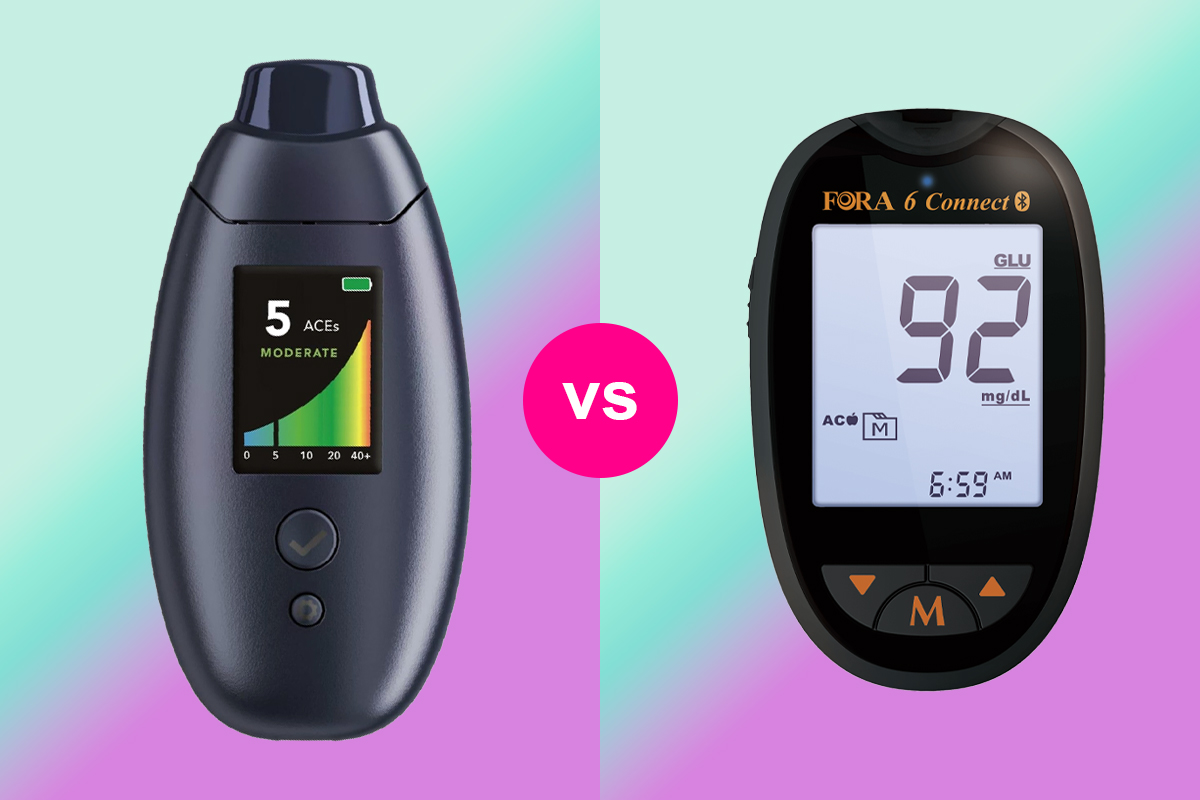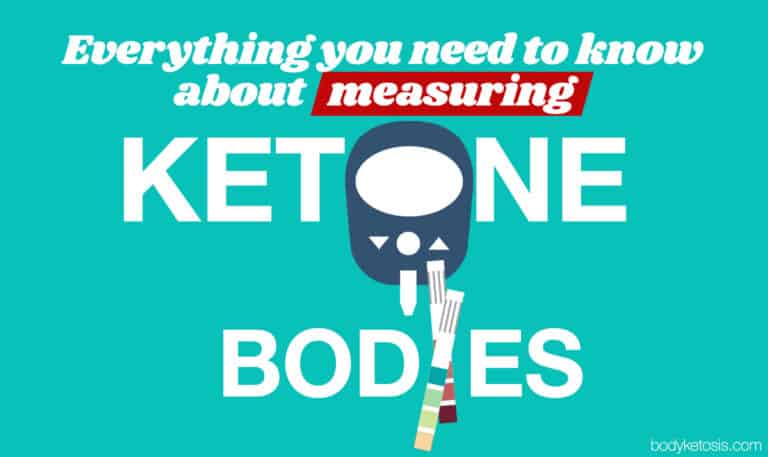Ketone Breath Meter vs Blood Ketone Meter: Which is Better? (2024)

Measuring your ketone levels is the secret to long-term ketogenic diet success.
But choosing between a ketone breath meter vs blood meter isn’t that simple.
Both tools are popular among ketoers, but they differ in price, convenience, and user experience.
Here’s everything you need to know.
| Category | Ketone Breath Meter | Blood Ketone Meter |
|---|---|---|
| Testing Method | Breath measurement | Blood measurement |
| Ketone Type | Acetone | Beta-hydroxybutyrate |
| Accuracy | High, current levels | High, current levels |
| Time to Result | ~1 minute | ~5 minutes |
| Convenience | Easy to use on the go | Requires pricking finger |
| Invasiveness | Non-invasive | Invasive |
| Readings Format | Digital screen | Digital screen |
| Usage Type | Reusable | Reusable |
| Shelf Life | 1-2 times calibration per yr | 3-4 mo after opening (strips) |
| Learning Curve | Higher for accuracy | Medium |
| Upfront Cost | $50-$300 | $20-$150 |
| Long-Term Cost | Low | $0.5-$1.5 per measurement |
| Calibration | 1-2 times per year | No regular calibration |
| Influencing Factors | Alcohol, food, exercise | Dehydration, strip integrity |
| Best for | Intermediate keto dieters | Intermediate to pro dieters |
- Testing Method
- Accuracy
- Convenience
- Invasiveness
- Learning Curve
- Cost
- Calibration
- Influencing Factors
- Best for
Ketone Breath Meter vs. Blood Ketone Meter
The primary difference between a ketone breath meter vs a blood ketone meter is that a breath meter is a non-invasive way to measure current acetone levels in the breath. Blood ketone meters offer the most accurate results but require pricking a finger with every measurement.
Method of Testing
Breath Meter: A ketone breath monitor measures acetone levels in the breath. Acetone is the third and least abundant ketone body. The testing process involves breathing into the device, and the device provides the level of acetone in parts per million (PPM). This method is non-invasive and can be done at any time. (1)
Blood Meter: A blood ketone monitor measures the concentration of ketones, specifically beta-hydroxybutyrate, in the blood. The testing process involves drawing a small blood sample, typically from a fingertip prick. The blood is applied to a test strip inserted into the meter. The device then measures the concentration of ketones in the blood and displays results within seconds.
A ketone breath meter is a non-invasive way to measure ketone levels. It’s quick, easy, and can be done anywhere. A blood ketone meter offers the most precise, quantitative results, but it requires pricking a finger and costs more in the long term.
Accuracy
Breath Meter: A ketone breath meter is an accurate way of measuring ketone levels because it measures the current state of acetone in your breath. Breath monitors use sensors that are very sensitive to acetone and provide a specific level of acetone. (2)
Blood Meter: A blood ketone meter is considered the most accurate way to measure ketone levels. Clinical studies often rely on blood ketone meters due to their reliability in assessing an individual’s state of ketosis. Blood meters are more accurate than breath ketone meters and urine strips. (3)
A blood ketone meter is more accurate than a breath ketone meter. Blood ketone meters are designed to provide precise measurements of beta-hydroxybutyrate levels in the bloodstream. The accuracy of breath meters varies depending on the sensor and user behavior.
Convenience
Breath Meter: Using a ketone breath meter is convenient because you just breathe into the device, and it provides a measurement. Typically, in less than a minute. It’s perfect for use on the go. Plus, it’s reusable, so you can test your ketone levels as often as you want without needing to buy more supplies.
Blood Meter: Using a blood ketone meter is a straightforward process. The device requires a small blood sample and provides results within seconds. Blood meters are easy to use but are invasive and require a finger prick, which is not convenient to do when on the go. The device itself is portable and easy to use.
A breath ketone meter is more convenient to use than a blood ketone meter because it offers a non-invasive method of testing. The breath meter simply requires exhaling into the device, which is fast and easy to do on the go. While blood ketone meter requires a fingertip prick for a blood sample.
Cost
Breath Meter: The average price of a ketone breath meter is between $50 and $300, depending on the sensor and brand. For higher-end devices, there’s also the cost of calibration, around $30 to $70 per year. This ensures high accuracy.
Blood Meter: The average price of a blood ketone meter is between $20 and $150. However, the ongoing expenses can be substantial. Test strips, essential for the device’s function, can cost anywhere from $0.5 to $1.5 each. Regular users might also incur costs for lancets and calibration solutions. While starter kits might offer initial savings, the continuous purchase of test strips can make the overall cost significant over time. (4)
Ketone breath meters have a higher upfront cost than blood meters but are cheaper in the long run. This is because blood ketone meters require ongoing purchases of test strips and lancets. Breath meters require occasional calibration, but in the long term, it is cheaper than purchasing ketone strips for every measurement.
Calibration
Breath Meter: Most ketone breath meters need regular calibration in order to provide accurate measurements consistently. The average calibration interval is around 1-2 times per year, depending on the number of test cycles. Most high-quality brands offer calibration services. (5)
Blood Meter: Blood ketone meters’ calibration requirements vary by brand. The Keto Mojo meter comes pre-calibrated, while the Freestyle meter needs calibration upon first use. Unlike breath meters, which often require ongoing calibration, most blood meters don’t necessitate frequent adjustments. However, most brands offer calibration control solutions, allowing users to manually calibrate their devices at home. (6, 7)
In terms of calibration, blood ketone meters generally have an advantage. While some brands come pre-calibrated or require minimal adjustments, breath ketone meters often need ongoing calibration to maintain accuracy. The infrequent calibration needs of many blood meters make them more user-friendly and reliable for consistent readings over time.
Influencing Factors
Breath Meter: Ketone breath meter results are influenced by breathing technique and outside factors. The main influencing factors include the time of the measurement, fasting, exercise, alcohol, foods and drinks, and even smoking.
Blood Meter: Blood ketone meter results are influenced by hydration levels, medication, expired or improperly stored test strips, and meter calibration. Hydration can dilute blood ketone concentrations, certain medications may interfere with readings, and test strip integrity is crucial for accuracy. (8)
Both ketone breath meter and blood ketone meter measurements are influenced by outside factors. Breath meters are influenced by alcohol, food intake, and breath technique, while blood meters are affected by hydration, medication, and test strip integrity. Blood meters generally offer more consistent results, as many of their influencing factors can be controlled more easily.
Invasiveness
Breath Meter: Using a ketone breath meter is a non-invasive way to measure ketone levels. It’s a non-invasive method as it only requires breath and doesn’t involve any bodily fluids or penetration of the skin.
Blood Meter: The main downside of a blood ketone meter is that it’s an invasive way to measure ketone levels. A blood ketone meter requires a small blood sample, typically obtained through a fingertip prick using a lancet. This invasive method involves breaking the skin, causing minor discomfort to the user.
Breath ketone meters are less invasive compared to blood ketone meters. While the blood meter requires a fingertip prick to obtain a blood sample, causing minor discomfort, the breath meter simply involves exhaling into the device, eliminating the need to break the skin or draw blood.
Learning Curve
Breath Meter: For consistently accurate results, the learning curve of ketone breath meters is high. To achieve high accuracy, the user needs to use the correct breathing technique, take measurements between meals and exercise, and avoid influencing factors like alcohol and minty products.
Blood Meter: Using a blood ketone meter involves learning to properly prick the fingertip, apply the blood sample to a test strip, and interpret the results. While the process is straightforward, some users might need practice to consistently obtain accurate readings. Familiarity with the device’s functions and calibration can also influence the learning curve.
Blood ketone meters have a lower learning curve than breath ketone meters. While both meters are user-friendly, the breath meter’s accuracy can be more influenced by factors like breathing technique and timing. However, once users master the simple blood draw and application for the blood meter, results are more consistently precise.
Best For
Breath Meter: A ketone breath meter is best for people who are serious about their ketogenic diet and want to know how deep in ketosis they are. It’s ideal for users who want to measure ketone levels several times per day and need fast results.
Blood Meter: A blood ketone meter is best for people who need high precision in their ketosis measurements. It’s best for users who prioritize accuracy over convenience and are willing to undergo a minor invasive procedure.
Both ketone breath meters and blood ketone meters are popular among those on a ketogenic diet. However, many on a long-term ketogenic diet prefer breath meters for their convenience and consistent accuracy.

Alex is the founder of Bodyketosis, an author, low-carb enthusiast, and a recovering chubby guy who reclaimed his health using the ketogenic lifestyle. The need for the keto life began after his aunt and cousin were diagnosed with type 2 diabetes and he was next in line. Through personal experience and extensive scientific research, Alex offers insightful tips for everything keto.



![28 Useful “Keto Gifts” for the KETO Fan in Your Life [2024]](https://bodyketosis.com/wp-content/uploads/2018/10/keto-gift-ideas-768x457.jpg)

![11 Delicious Low-Carb Protein Bars for Keto [Cure Cravings]](https://bodyketosis.com/wp-content/uploads/2019/03/low-carb-protein-bar-for-keto-768x457.jpg)

![In-Depth Keto Mojo Review 2024 [Hint: Accurate and Affordable]](https://bodyketosis.com/wp-content/uploads/2019/06/keto-mojo-review-768x457.jpg)